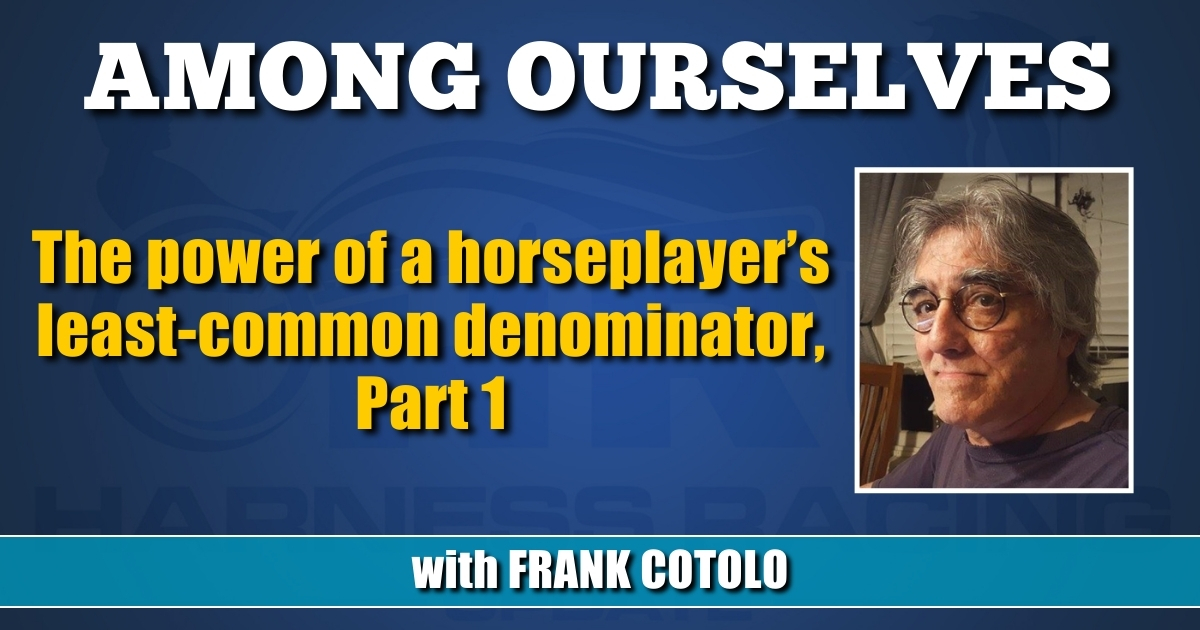The power of a horseplayer’s least-common denominator, Part 1
by Frank Cotolo
The members of my so-called league of gentleman handicappers comprised a think tank of knowledge documented in a huge library of theories built from the laws of probability. Each book was a jewel of expertise featuring diagrams for success.
However…
The entirety of their published texts left me inundated.
Then somewhere along the line I realized each one of the talented logicians praised the values of the others’ calculations (the type of respect intellects are known to present) but individually each gentleman rarely approached their personal pari-mutuel wagering activity outside of their own frameworks.
This left me — one of their strongest enthusiasts — with a dire problem: What elements did all of their methods have in common? How could I sensationalize upon such elements without passing an entrance exam for admission to Harvard?
The solution did not come quickly. I needed time to evaluate the guts of it all and discover a common denominator to apply sophisticated math to my comic-by-comparison means of playing pari-mutuels and feel confident I could legally take money from other players.
I ruminated while keeping busy with my writing career.
When I was not on the road with the Wolfman or in recording or broadcast studios or on TV and movie sets with him, I sat in my Hollywood apartment pounding my IBM electric typewriter keys smoking cigarettes and weed and drinking pots of strong expensive dark coffee. Any risk of busting brain cells (not that I could do that kind of math) did not stop me from adding another activity when the Los Alamitos harness meet opened. After all of the thoroughbred academia injected into my noggin’ I yearned to be ambling at the track in the company of harness racing’s west coast characters.
I brought my weary muscles and healthy betting bankroll to a fresh Los Al harness meet. My mind and body felt most comfortable playing harness racing but this time my mind was asked to work harder on the challenge of finding the common denominator; this was a do-or-die task. It demanded cooperation between my brain and brawn. Lifestyle was on the line. Was I to survive the intensity of the new academics for financial success while jeopardizing my lucrative career in the entertainment business (no less any form of social life)? The main question narrowed to this: Would I discover how to do something I was incapable of doing? And at the same time disassemble my career?
It was a gamble.
Armed with the human mechanics of youth, I marched up and down the Los Al apron for as many night harness programs as I could fit into a seven-day-a-week work schedule without total body collapse.
The mainstay Los Al driver and trainer characters remained pertinent to my usual betting efforts. I loved them all more than any thoroughbred jockeys. A few of them would unknowingly play major roles in my common-denominator enlightenment.
So would Barry Meadow.
Of all the league’s gentlemen handicappers I would see more of Barry Meadow because he was still the harness guy (later he would switch to playing only thoroughbreds due to the miserable state of harness racing in California). He was always in his clubhouse box or at the betting windows at Los Al. I visited him only now and again because I respected the fact that he was there every evening working at making a living; the last thing he needed was a visitor as talented as I in the art of distraction. And I was not even the worse of that kind. A racetrack is lousy with distractors.
As important as my challenge became, I was aware racetracks were no places to learn the courteous expressions of regard. Even though Barry was a wizard at absorbing rapid numbers changing in the win and place and show pools and values of exacta combinations demanding he play or pass I kept to myself a lot. Others thought nothing of cavorting with anyone they knew or did not know.
For instance…
There was one regular fellow moving from apron to boxes and through the clubhouse and maybe even skipping around the parking lot who touted specific combinations without requests to do so.
“Two six, nothing else,” he shouted before a race. “Three five, that’s all” before another race and “Seven one,” and on and on he sent his messages that no player I knew ever received as valuable.
And there were always the lonesome players in need of conversations about handicapping efforts with anyone else.
“Who do you like?” one fellow said to me.
“The six.”
“Me too.” And his explanation followed, testing your patience.
Or the kinds searching for conflict.
“Who do you like?”
“The nine.”
“Whatta you nuts? That horse stinks and so’s his driver…”

















